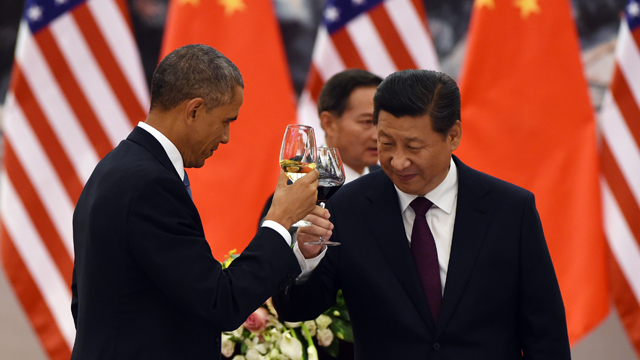This post first appeared at The Huffington Post.
Is it really China or us?
If we don’t set the rules, China will, President Obama warned in his State of the Union Address, which was otherwise mostly a welcome call to action against economic inequality. President Obama stressed that Trade Promotion Authority, or Fast Track, and the Trans-Pacific Partnership (TPP) were about China or us. This week US Trade Representative Michael Froman flew to Dallas to attend a constituent meeting with Rep. Eddie Bernice Johnson (D-TX) and said the same thing.
But is this an economic argument or an argument from the National Security Council and the State Department? Are US working women and men again being called out to sacrifice, despite 30 years of no wage increases and millions of lost jobs, our cities hollowed out by the flight of once-good-paying manufacturing jobs to countries with pay that’s 90 percent lower, no rights for workers or environmental regulation? Or do the president and the USTR really believe they are making an economic argument — that US workers will be better served competing with Vietnam’s 75-cents-an-hour average pay?
If it really is China or us, why don’t we address currency manipulation and prevent Japan and other TPP nations from following China’s example of controlling exchange rates so that our exports can’t compete?
And if it is really China or us, why does the USTR insist on guaranteeing multinational corporations profits when they invest abroad? Vietnam, Malaysia, Singapore and Brunei are certainly not interested in one-way lawsuits by multibillion-dollar corporations if they enact any legislation that threatens those corporate profits! Investor-State Dispute Settlement cases from old free trade agreements like NAFTA and CAFTA have already forced mostly poorer nations to pay tens of millions of dollars in settlements and arbitration awards, and 500 cases are pending now.
In fact, our trade framework is an unholy alliance between the geopolitical concerns of the State Department and the business interests of the US Chamber of Commerce and Business Roundtable. US workers and those who care about the environment, global health care, human rights, consumer safety, balanced trade and manufacturing renewal are left out. We’ve heard nearly identical promises from Presidents Clinton, Bush and Obama regarding previous deals with China, Mexico, Colombia, Honduras, Guatemala and Korea.
Those deals and others like them have led to the US accumulating more than $10 trillion in trade deficits over the past 20 years, far more than the rest of the world combined. Those deals have emptied small and large cities from Trenton to St. Louis of millions of jobs that would have provided a decent income to urban America. Instead our cities are burned out and in the case of Detroit and others, bankrupt.
At the Dallas meeting, Froman said that the labor and environmental chapters of the TPP were a big improvement for American workers and environmentalists. That is true for those who compare the text to older agreements. But the enforcement of these chapters is exactly the same. It’s the same story as I saw firsthand in Honduras, where our joint complaint was filed three years ago or Guatemala where Froman finally intervened six years after similar complaints about the destruction of human rights, failure to pay even the pitiful minimum wage or enforce any labor regulations.
In fact, enforcement of virtually all of the TPP, except for the secret arbitration of profit obstacles for foreign corporations, is done by the USTR. In addition to the differences in speed, for citizen complaints there are no reparations, and there has never been any meaningful enforcement for US workers or environmentalists in 20 years of these trade deals aside from some litigation against China for unfair competition and with little result.
Next week Sen. Orrin Hatch (R-UT) and Rep. Paul Ryan (R-WI) will likely drop the same old Fast Track that we have seen the past 21 years. Fast Track guarantees a quick vote with little debate and no amendments in the House and Senate for the TPP and likely any other trade deal for years to come — well into the next president’s term of office. Hopefully some senators will stand up and shout about it, but likely Fast Track gets rammed through that body. The fight is in the House where 80 percent or more of Democrats are likely to vote “no,” and right now they’re joined by enough Republicans to stop it. But Boehner Trade will only be stopped for sure if millions of Americans stand up and shout “NO.” We are mobilizing like never before to say we have had enough. The coalition against Fast Track is massive.
We say to our president and his allies on the TPP, House Speaker John Boehner (R-OH) and Senate Majority Leader Mitch McConnell (R-KY), that no other government has Fast Track. This is not what democracy looks like — secret trade deals rammed through in record time that guarantee fat corporate profits, but likely result in net job loss and wage competition that leads to pay stagnation in the US for years to come. We have had enough of corporate lawsuits against nations that attempt to stop the destruction of their environment or promote public safety.
This time talk about American workers once again competing and winning in the world economy with their hands tied behind their backs, while stock prices zoom and CEO pay rises will not confuse us. Our voices will be heard and Fast Track will be stopped!
The views expressed in this post are the author’s alone, and presented here to offer a variety of perspectives to our readers.



